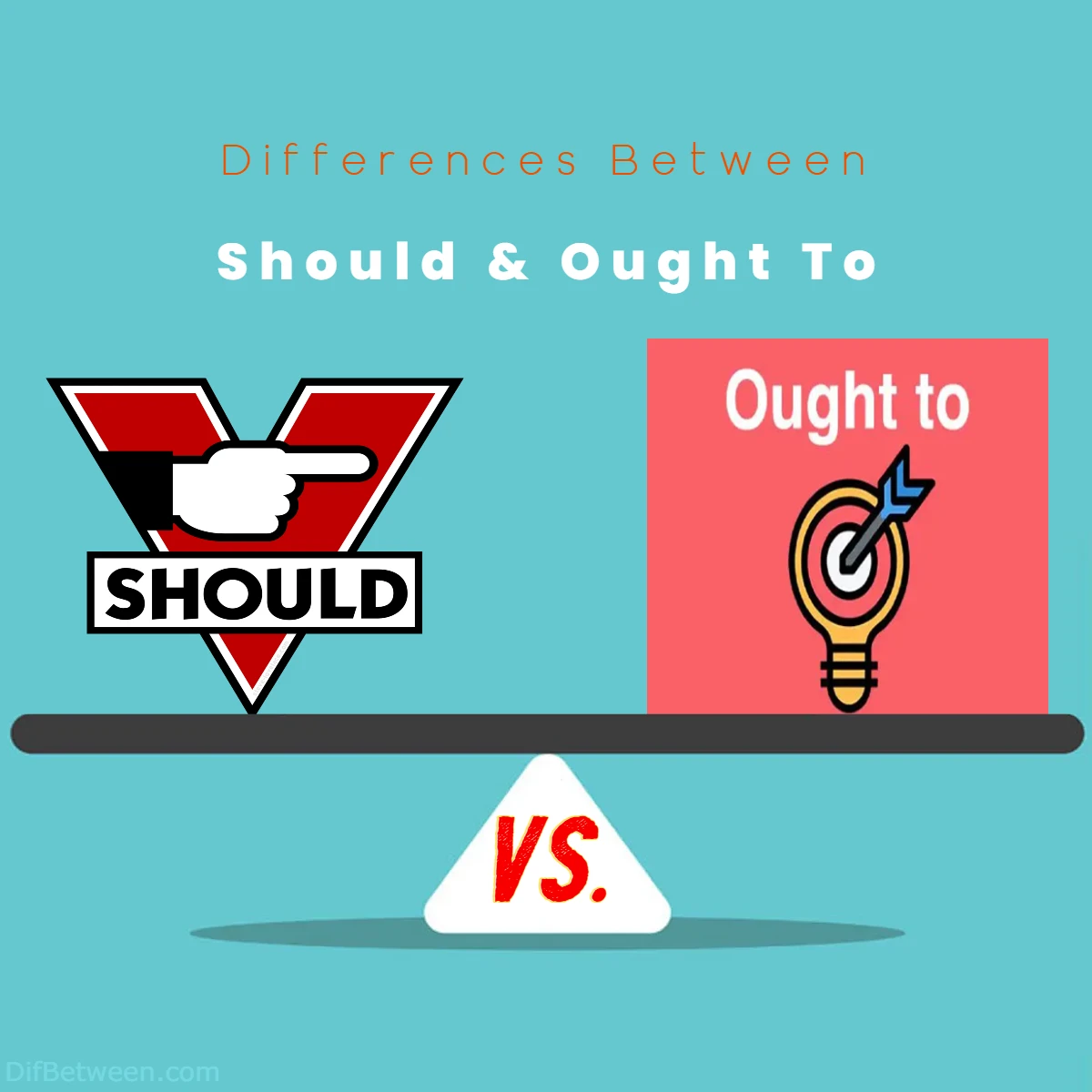
| Aspect | “Should” | “Ought To” |
|---|---|---|
| Degree of Obligation | Moderate | Stronger |
| Contextual Usage | Advice, Recommendations, Conforming to Expectations | Moral Imperatives, Moral and Ethical Contexts |
| Formality | Versatile (formal and informal) | Often Slightly More Formal |
| Legal and Regulatory Context | Recommendations, Not Binding Laws | Legal Obligations (Less Common) |
| Ethical and Philosophical Considerations | Ethical Dilemmas, Exploring Perspectives | Moral Imperatives, Ethical Principles |
| Parental Guidance and Child-Rearing | Parental Advice, Informal Guidance | Moral Education, Instilling Values |
| Workplace Scenarios | Professional Advice, Behavior Recommendations | Ethical Workplace Behavior |
| Cultural and Regional Variations | Usage Varies Based on Regional Preferences | Usage May Align with Local Conventions |
| Real-Life Situations (Examples) | Health and Wellness, Environmental Responsibility, Parental Guidance, Workplace Ethics | Varying Emphasis Based on the Message |
In a language as rich and diverse as English, even the tiniest of words can carry significant meaning. These linguistic twins often leave us pondering which one to embrace, much like choosing between two equally delicious desserts.
Differences Between Should and Ought To
The main differences between “should” and “ought to” lie in the level of obligation they convey. “Should” implies a moderate obligation, often used for advice or recommendations, allowing room for discretion. In contrast, “ought to” carries a stronger sense of duty, emphasizing moral or ethical obligations. Understanding these nuances is crucial for effective communication, as it enables you to convey precisely the level of obligation or moral imperative required in different contexts.
The Fundamental Meaning
Let’s start by examining the fundamental meanings of “should” and “ought to.”
Should
“Should” is a modal verb that is commonly used to express advice, recommendations, obligations, or expectations. It implies that something is the right or sensible thing to do based on societal norms, personal beliefs, or established rules. It often indicates a strong suggestion without necessarily implying a strict requirement.
Examples:
- You should wear a helmet while riding a bicycle for safety.
- He should study for his exams if he wants to pass.
Ought To
“Ought to”, on the other hand, is another modal verb used to convey a sense of duty, moral obligation, or necessity. It suggests that something is morally or socially right and should be done. “Ought to” tends to carry a slightly stronger sense of obligation than “should.”
Examples:
- We ought to help those in need during difficult times.
- You ought to apologize for your mistake; it’s the right thing to do.
Degrees of Obligation
One of the primary distinctions between “should” and “ought to” lies in the degree of obligation they convey. To clarify this further, let’s examine how they differ in terms of obligation:
Should: Moderate Obligation
“Should” typically implies a moderate level of obligation. It suggests that an action is advisable or recommended, but not necessarily mandatory. People often have some degree of discretion when using “should,” and it allows for flexibility.
Examples:
- You should try the seafood at that restaurant; it’s excellent. (Suggestion, but not mandatory)
- She should call her parents regularly to stay in touch. (Recommended, but not obligatory)
Ought To: Stronger Obligation
In contrast, “ought to” conveys a stronger sense of obligation. When you say someone “ought to” do something, you’re emphasizing that it is the right or moral thing to do, and there is a greater expectation of compliance.
Examples:
- He ought to be honest with his partner about his feelings. (Moral duty)
- We ought to respect the environment and reduce our carbon footprint. (Moral obligation)
Societal Norms and Expectations
Another aspect to consider when differentiating between “should” and “ought to” is the context of societal norms and expectations.
Should: Conforming to Expectations
“Should” often relates to conforming to societal or conventional expectations. It suggests actions that align with commonly accepted practices or standards.
Examples:
- You should arrive on time for the job interview. (Conforming to professional norms)
- In a formal setting, you should address people by their titles. (Conforming to etiquette)
Ought To: Moral Imperatives
On the other hand, “ought to” leans more towards moral imperatives and personal values. It emphasizes actions that are guided by a sense of what is morally right or ethical.
Examples:
- We ought to help those less fortunate in our community. (Moral imperative)
- You ought to stand up for what you believe is right, even in the face of adversity. (Personal values)
Formal vs. Informal Usage
The choice between “should” and “ought to” can also be influenced by the formality of the context. Let’s explore how they differ in formal and informal situations.
Should: Versatile and Neutral
“Should” is a versatile and neutral term that can be used in both formal and informal settings. It’s suitable for everyday conversations, written communication, and professional discourse.
Examples:
- You should check the weather forecast before planning your outdoor activities. (Informal)
- The company should consider implementing cost-saving measures. (Formal)
Ought To: Often More Formal
“Ought to”, while not exclusively formal, tends to lean towards a slightly more formal tone. It is commonly used in written communication, advice from experts or authorities, and situations where a stronger sense of duty or obligation is required.
Examples:
- Students ought to consult their academic advisors before selecting courses. (Semi-formal)
- The government ought to prioritize healthcare reform to improve the lives of citizens. (Formal)
Conditional Usage
Both “should” and “ought to” can be used in conditional statements to express hypothetical situations or consequences. However, they slightly differ in how they convey these conditions.
Should: Conditional Advice
“Should” in conditional statements often suggests advice or recommendations based on a specific condition or circumstance. It maintains its sense of moderate obligation in these contexts.
Examples:
- If it rains, you should take an umbrella. (Advice based on a condition)
- Should you encounter any difficulties, please don’t hesitate to contact us. (Conditional advice)
Ought To: Conditional Moral Imperative
“Ought to” in conditional statements carries a sense of moral imperative even in hypothetical scenarios. It emphasizes the right course of action regardless of the circumstances.
Examples:
- If you find a lost wallet, you ought to try to return it to its owner. (Moral duty in a hypothetical situation)
- Even in times of crisis, we ought to prioritize compassion and empathy. (Moral imperative in a hypothetical scenario)
Legal and Regulatory Context
Should: Legal Recommendations
In the legal and regulatory realm, “should” is often used to convey recommendations or guidelines. These recommendations are not binding laws but are considered best practices.
Examples:
- Companies should regularly update their privacy policies to comply with data protection regulations.
- Drivers should follow the speed limits set by local authorities.
Ought To: Legal Obligations
In contrast, “ought to” can be used to emphasize legal obligations. While not as common as “should” in legal contexts, it conveys a stronger sense of duty.
Examples:
- Employers ought to provide a safe working environment for their employees as mandated by law.
- Citizens ought to pay their taxes on time to fulfill their civic responsibilities.
Ethical and Philosophical Considerations
Should: Ethical Dilemmas
When discussing ethical dilemmas or moral quandaries, “should” is often employed to explore different perspectives and opinions. It signifies a moral evaluation of actions.
Examples:
- Should one lie to protect someone’s feelings, or is honesty always the best policy?
- Should society prioritize individual freedom over collective safety?
Ought To: Moral Imperatives
“Ought to”, in these contexts, underscores moral imperatives and ethical principles. It indicates actions that align with universally accepted moral standards.
Examples:
- We ought to respect the autonomy of others and refrain from imposing our beliefs on them.
- In the face of injustice, individuals ought to stand up for what is right, even if it means taking risks.
Parental Guidance and Child-Rearing
Should: Parental Advice
Parents often use “should” to offer advice and guidance to their children. It implies recommendations based on parental wisdom and experience.
Examples:
- You should eat your vegetables to stay healthy.
- Children should be respectful to their elders.
Ought To: Moral Education
“Ought to” can be employed to impart moral values and ethics to children. It emphasizes the importance of instilling principles and responsibilities.
Examples:
- Children ought to learn the value of empathy and kindness towards others.
- Parents ought to teach their kids the significance of honesty and integrity.
Workplace Scenarios
Should: Professional Advice
In a professional context, “should” is often used to offer advice or recommendations related to work tasks and behavior in the workplace.
Examples:
- Employees should communicate effectively with their colleagues to enhance teamwork.
- Managers should provide constructive feedback to help employees grow in their roles.
Ought To: Ethical Workplace Behavior
“Ought to” can be employed in the workplace to emphasize ethical behavior and adherence to company values.
Examples:
- Employees ought to report any unethical behavior they observe within the organization.
- Leaders ought to lead by example, demonstrating honesty and integrity to inspire their teams.
Should or Ought To: Which One is Right Choose for You?
Navigating the subtle nuances of the English language can be like exploring a maze. The choices between seemingly similar words can often leave you wondering which is the right one to use. “Should” and “ought to” are prime examples of such words. In this guide, we’ll help you decide which one is the better fit for your specific communication needs.
Assessing the Context
The first step in choosing between “should” and “ought to” is to consider the context in which you plan to use them. Different situations call for different levels of obligation and emphasis.
Should: The Middle Ground
“Should” generally occupies the middle ground in terms of obligation. It’s versatile and can be used in a wide range of contexts, making it suitable for both formal and informal communication. Use “should” when you want to suggest or recommend something without imposing a strict obligation.
When to Use “Should”:
- Advice: When offering suggestions or advice.
- Recommendations: When making recommendations based on best practices.
- Informal and Formal Settings: In everyday conversations, written communication, and formal discourse.
Ought To: A Stronger Emphasis
“Ought to” leans towards a stronger emphasis on obligation and moral responsibility. It’s often used to convey a sense of duty, ethics, or social norms. Choose “ought to” when you want to underscore a higher level of obligation or emphasize moral principles.
When to Use “Ought To”:
- Moral Imperatives: When discussing actions that align with universally accepted moral standards.
- Ethical Considerations: In conversations about ethics and values.
- Formal and Semi-Formal Settings: In written communication, advice from authorities, or when a stronger sense of duty is required.
Considering Your Message
The choice between “should” and “ought to” also depends on the message you want to convey. Let’s explore various messages and which term aligns better with each.
Message 1: Friendly Advice
“Should” is your go-to when you want to offer friendly advice or suggestions without sounding overly prescriptive.
Example:
- You should try the cheesecake; it’s delicious.
Message 2: Moral Duty
When emphasizing a moral duty or ethical responsibility, “ought to” conveys a more compelling message.
Example:
- We ought to show kindness to those in need.
Message 3: Professional Recommendations
In professional settings, “should” can be used for recommendations without coming across as too authoritative.
Example:
- Employees should submit their reports by the deadline.
Message 4: Ethical Workplace Behavior
To stress ethical behavior in the workplace, especially in written documents or codes of conduct, consider using “ought to.”
Example:
- Employees ought to report any unethical behavior they witness.
Cultural and Regional Variations
Be aware that language usage can vary based on cultural and regional factors. Some English speakers, particularly in British English, may have a preference for “ought to” in certain contexts. Consider the linguistic conventions of your audience when choosing between the two terms.
Your Personal Style
Your personal communication style can also influence your choice between “should” and “ought to.” If you tend to favor a more formal tone or wish to emphasize ethics and moral values in your speech or writing, “ought to” may be your preferred option. On the other hand, if you prefer a more casual and adaptable style, “should” offers greater flexibility.
Summary
In the grand debate of “should” vs. “ought to,” the choice ultimately boils down to the context, your intended message, your audience’s expectations, and your personal communication style. Both words serve essential roles in the English language, enabling you to convey advice, recommendations, obligations, and moral principles effectively.
So, whether you should or ought to choose one over the other depends on your unique circumstances. By understanding the subtle distinctions and considering these factors, you can confidently wield these words to express yourself with precision and impact in any situation.
FAQs
The fundamental difference lies in the degree of obligation. “Should” implies a moderate obligation, often used for recommendations, while “ought to” conveys a stronger sense of duty, emphasizing moral or ethical obligations.
You should use “should” when you want to suggest or recommend something without imposing a strict obligation. It’s versatile and suitable for both formal and informal contexts.
“Ought to” is more appropriate when you want to emphasize a higher level of obligation or underscore moral principles. It’s often used in ethical or formal contexts.
Yes, there can be regional variations. Some English speakers, particularly in British English, may have a preference for “ought to” in specific contexts. However, both terms are widely understood and used interchangeably in most English-speaking regions.
Certainly! You should use “should” for friendly advice like “You should try the new restaurant.” On the other hand, “ought to” is more suitable for moral imperatives such as “We ought to help those in need.”
Your choice depends on the context, the level of obligation you want to convey, and your personal style. Consider whether you want to offer advice or emphasize moral duty, and tailor your choice accordingly.
“Should” is versatile and can be used in both formal and informal settings. “Ought to” tends to lean towards a slightly more formal tone but can still be used in semi-formal contexts.
Yes, cultural factors can influence the choice. Some cultures may have preferences for one term over the other in specific contexts. It’s essential to consider the linguistic conventions of your audience.
While they can often be used interchangeably, understanding their nuances enables you to communicate more precisely. Choose the one that best aligns with the degree of obligation and emphasis you wish to convey in a given context.
For a comprehensive understanding of the distinctions and practical usage of these terms, you can read our detailed guide on the “Differences Between Should vs Ought To” in our blog.
Read More:
Contents






